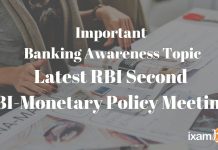Read on to learn whether the IBPS RRB is under the Central or State Government.
What is the IBPS?
The IBPS, or Institute of Banking Personnel Selection, is an autonomous agency in India that conducts recruitment exams and provides selection services for various public sector banks and other financial institutions. It was established in 1975 as a self-governing academic and research-oriented institute. The primary purpose of IBPS is to streamline the recruitment process for banks and financial institutions by conducting standardized exams and assessments for various positions, such as probationary officers (PO), clerks, specialist officers, and regional rural bank officers. IBPS aims to ensure transparency, efficiency, and fairness in the selection process.
It’s important to note that IBPS does not provide jobs itself but facilitates the recruitment process for its member banks and organizations. Many public sector banks in India participate in IBPS recruitment processes to hire candidates for various positions, making it a crucial institution in the country’s banking sector.

What are Regional Rural Banks?
Regional Rural Banks (RRBs) are financial institutions in India that were established with the primary goal of promoting financial inclusion and providing banking and financial services to rural and semi-urban areas. RRBs were introduced in India in 1975 under the provisions of the Regional Rural Banks Act, 1976. These banks are a collaborative effort between the Central Government, State Governments, and sponsor banks.
The RRBs are specifically mandated to serve the banking and credit needs of rural and semi-urban areas in India. They play a vital role in extending banking services to remote and underbanked regions, thereby promoting rural development. RRBs have played a vital role in improving access to financial services and credit in rural India. They contribute to the economic development of rural areas by facilitating agricultural and rural enterprise growth, thereby reducing poverty and promoting self-sufficiency. These banks have a unique position in India’s banking landscape, bridging the gap between traditional commercial banks and the banking needs of rural and semi-urban communities.
List of Participating Regional Rural Banks
Read below the comprehensive list of Regional Rural Banks that recruit personnel through the IBPS RRB recruitment process.
| States/ UTs | Name of RRBs |
| Andhra Pradesh | Andhra Pragathi Gramin Bank |
| Andhra Pradesh | Chaitanya Godavari Grameena Bank |
| Andhra Pradesh | Saptagiri Grameena Bank |
| Arunachal Pradesh | Arunachal Pradesh Rural Bank |
| Assam | Assam Gramin Vikash Bank |
| Bihar | Dakshin Bihar Gramin Bank |
| Bihar | Uttar Pradesh Gramin Bank |
| Chhattisgarh | Chhattisgarh Rajya Gramin Bank |
| Gujarat | Baroda Gujarat Gramin Bank |
| Gujarat | Saurashtra Gramin Bank |
| Haryana | Sarva Haryana Gramin Bank |
| Himachal Pradesh | Himachal Pradesh Gramin Bank |
| J & K | Ellaquai Dehati Bank |
| J & K | J & K Gramin Bank |
| Jharkhand | Jharkhand Rajya Gramin Bank |
| Karnataka | Karnataka Gramin Bank |
| Karnataka | Karnataka Vikas Grameena Bank |
| Kerala | Kerala Gramin Bank |
| Madhya Pradesh | Madhya Pradesh Gramin Bank |
| Madhya Pradesh | Madhyanchal Gramin Bank |
| Maharashtra | Maharashtra Gramin Bank |
| Maharashtra | Vidharbha Konkan Gramin Bank |
| Manipur | Manipur Rural Bank |
| Meghalaya | Meghalaya Rural Bank |
| Mizoram | Mizoram Rural Bank |
| Nagaland | Nagaland Rural Bank |
| Odisha | Odisha Gramya Bank |
| Odisha | Utkal Grameen Bank |
| Puducherry | Puduvai Bharathiar Grama Bank |
| Punjab | Punjab Gramin Bank |
| Rajasthan | Baroda Rajasthan Kshetriya Gramin Bank |
| Rajasthan | Rajasthan Marudhara Gramin Bank |
| Tamil Nadu | Tamil Nadu Grama Bank |
| Telangana | Andhra Pradesh Grameena Vikas Bank |
| Telangana | Telangana Grameena Bank |
| Tripura | Tripura Gramin Bank |
| Uttar Pradesh | Aryavart Bank |
| Uttar Pradesh | Baroda UP Bank |
| Uttar Pradesh | Prathama UP Gramin Bank |
| Uttarakhand | Uttarakhand Gramin Bank |
| West Bengal | Bangiya Gramin Bank |
| West Bengal | Paschim Banga Gramin Bank |
| West Bengal | Uttarbanga Kshetriya Gramin Bank |
IBPS RRB: Central or State Government?
RRBs are jointly owned by the Central Government, the respective State Government where they operate, and the sponsor banks. Sponsor banks are typically commercial banks or public sector banks that provide financial and managerial support to RRBs. The ownership structure typically involves a certain percentage of capital contribution from each of the three stakeholders. The Central Government, State Government, and sponsor banks share the capital in a pre-determined ratio. RRBs have a wide network of branches and extension counters in rural and semi-urban areas, making banking services accessible to the local population. They are expected to cater to the credit needs of agriculture, small-scale industries, and other rural sectors. Let us learn more in the following section.
Is the IBPS RRB Under the Central or State Government?
The establishment and functioning of IBPS RRB jobs represent a collaborative effort involving various stakeholders, including the Central Government, State Government, and Sponsor Bank. This unique ownership structure is designed to ensure the effective delivery of banking and financial services to rural and semi-urban areas of India, contributing significantly to the nation’s economic development.
- IBPS RRBs are distinctive in their ownership structure, which fosters a sense of shared responsibility and commitment among the involved parties. The equity of RRBs is distributed among these stakeholders in a carefully determined proportion:
- Central Government holds 50% Share: The Central Government of India plays a pivotal role in the establishment and oversight of RRBs. By holding a 50% share, it demonstrates its commitment to ensuring that these rural-focused banks operate in alignment with national financial inclusion objectives and guidelines.
- State Government holds 15% Share: The respective State Governments in the regions where RRBs operate contribute 15% of the equity. This allocation underscores the significance of local governance in tailoring banking services to meet the specific needs of rural communities within each state.
- Sponsor Bank holds 35% Share: The remaining 35% of the equity is held by the Sponsor Bank. These are typically established commercial banks or public sector banks with the financial acumen and expertise to guide RRBs, providing them with crucial financial and managerial support.
Why are RRBs Owned in Collaboration?
This collaborative ownership structure serves a multi-fold purpose:
- Promoting Rural Development: The combination of Central Government, State Government, and Sponsor Bank involvement ensures that RRBs remain dedicated to the development of rural areas by providing accessible and tailored banking solutions.
- Mitigating Risk: The partnership approach helps in mitigating risks associated with banking operations in rural and semi-urban regions, as it draws on the strengths and resources of each stakeholder.
- Ensuring Financial Stability: By incorporating the Central Government’s significant share, RRBs benefit from a strong foundation that enhances their stability and sustainability, while the Sponsor Bank’s contribution bolsters their operational capabilities.
- Local Relevance: The allocation of equity to State Governments ensures that the banking services offered by RRBs remain relevant and responsive to the unique requirements of each state’s rural population.
- Therefore, the IBPS RRB model exemplifies the power of collaboration between the central and state governments, as well as established financial institutions, in driving financial inclusion, rural development, and economic empowerment in India’s hinterlands.
- This joint effort underscores the commitment to equitable access to banking services and the holistic growth of rural communities.
IBPS RRB Exams
The IBPS RRB (Institute of Banking Personnel Selection – Regional Rural Banks) is a government job recruitment process that aims to fill various positions, including Officer Scale-I, II, III, and Office Assistant roles in rural and semi-urban banks across India. IBPS is responsible for conducting the recruitment exams and ensuring a fair and standardized selection process.
- IBPS conducts a series of examinations to recruit candidates for different posts in RRBs. These exams include preliminary and main exams, interviews, and document verification, depending on the position applied for.
- Prior to the preliminary examination, IBPS provides pre-exam training for eligible candidates, specifically those belonging to SC (Scheduled Caste), ST (Scheduled Tribe), or minority communities. This training is aimed at helping candidates from these communities prepare for the exams and build confidence in their abilities
- IBPS RRB recruitment is not limited to a single bank but encompasses a group of participating regional rural banks. As of the information provided, there are 43 participating banks involved in the IBPS RRB recruitment process. These banks collectively offer opportunities for candidates to work in rural banking and contribute to the development of rural areas.
The IBPS RRB recruitment process plays a vital role in expanding the reach of banking and financial services to rural and semi-urban regions of India. It also provides employment opportunities for candidates from diverse backgrounds, promoting inclusivity and diversity in the banking sector. Candidates who successfully clear the IBPS RRB exams have the chance to serve in various capacities within regional rural banks, contributing to rural development and financial inclusion efforts.
IBPS RRB Exam Preparation with ixamBee!
ixamBee is a specialized coaching platform dedicated to helping candidates prepare for bank and government job exams. There are several upcoming bank exams on the horizon, presenting a golden opportunity for those aspiring to become bank Probationary Officers (PO) or bank clerks, including the IBPS RRB exams. If you’re unsure about how to prepare effectively for these bank exams, you’ve come to the right place. ixamBee has introduced the “Super Pack” which is an all-encompassing Bank PO/Clerk Exams Online Course, designed to empower aspirants like you to turn your dreams of a banking career into reality! The “Super Pack” is an all-inclusive coaching program meticulously crafted to prepare you for both bank PO and bank clerk exams. Click on the link provided to learn more!
We wish you all success.
Also read
Life of an IBPS RRB Agriculture Officer
IBPS RRB PO Mains Exam Analysis 2021: Check the Exam Difficulty Level
SBI PO 2023: Eligibility Criteria & Study Plan for You!
How to Prepare for SBI PO Exam 2023: Preparation Tips and Tricks to Crack the Exam














